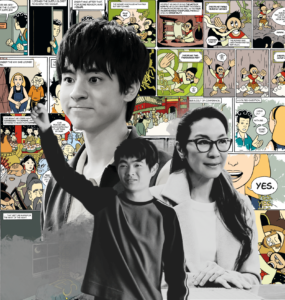Both parents and adult children often fail to recognize how profoundly the rules of family life have changed over the past half century.
Sometimes my work feels more like ministry than therapy. As a psychologist specializing in family estrangement, my days are spent sitting with parents who are struggling with profound feelings of grief and uncertainty. “If I get sick during the pandemic, will my son break his four years of silence and contact me? Or will I just die alone?” “How am I supposed to live with this kind of pain if I never see my daughter again?” “My grandchildren and I were so close and this estrangement has nothing to do with them. Do they think I abandoned them?”
Since I wrote my book When Parents Hurt, my practice has filled with mothers and fathers who want help healing the distance with their adult children and learning how to cope with the pain of losing them. I also treat adult children who are estranged from their parents. Some of those adult children want no contact because their parents behaved in ways that were clearly abusive or rejecting. To make matters worse for their children and themselves, some parents are unable to repair or empathize with the damage they caused or continue to inflict. However, my recent research—and my clinical work over the past four decades—has shown me that you can be a conscientious parent and your kid may still want nothing to do with you when they’re older.
[Read: Dear Therapist: My daughter hasn’t wanted a relationship with me for 25 years]
However they arrive at estrangement, parents and adult children seem to be looking at the past and present through very different eyes. Estranged parents often tell me that their adult child is rewriting the history of their childhood, accusing them of things they didn’t do, and/or failing to acknowledge the ways in which the parent demonstrated their love and commitment. Adult children frequently say the parent is gaslighting them by not acknowledging the harm they caused or are still causing, failing to respect their boundaries, and/or being unwilling to accept the adult child’s requirements for a healthy relationship.
Both sides often fail to recognize how profoundly the rules of family life have changed over the past half century. “Never before have family relationships been seen as so interwoven with the search for personal growth, the pursuit of happiness, and the need to confront and overcome psychological obstacles,” the historian Stephanie Coontz, the director of education and research for the Council on Contemporary Families, told me in an email. “For most of history, family relationships were based on mutual obligations rather than on mutual understanding. Parents or children might reproach the other for failing to honor/acknowledge their duty, but the idea that a relative could be faulted for failing to honor/acknowledge one’s ‘identity’ would have been incomprehensible.”
The historian Steven Mintz, the author of Huck’s Raft: A History of American Childhood, made a similar observation in an email: “Families in the past fought over tangible resources—land, inheritances, family property. They still do, but all this is aggravated and intensified by a mindset that does seem to be distinctive to our time. Our conflicts are often psychological rather than material—and therefore even harder to resolve.”
In The Marriage-Go-Round, the Johns Hopkins University sociologist Andrew Cherlin wrote that starting in the late 19th century, traditional sources of identity such as class, religion, and community slowly began to be replaced with an emphasis on personal growth and happiness. By the second half of the 20th century, American families had gone through changes that, Cherlin said, were “unlike anything that previous generations of Americans have ever seen.”
Deciding which people to keep in or out of one’s life has become an important strategy to achieve that happiness. While there’s nothing especially modern about family conflict or a desire to feel insulated from it, conceptualizing the estrangement of a family member as an expression of personal growth as it is commonly done today is almost certainly new.
Of course, not all individuals base their ideas of family on these more individualized principles. “Most immigrant families, especially those in the first generation, still value interdependence and filial duty,” Mintz noted. “However, in recent decades the majority of American families have experienced weakening [extended] kin ties and high rates of mobility and dispersion. I would argue that these factors have made the opportunities for familial alienation greater than in the past.”
Estrangement seems to affect a small but significant portion of families in the United States, and it is happening today against a backdrop of record-high parental investment. During the past 50 years, people across the classes have been working harder than ever to be good parents. They have given up hobbies, sleep, and time with their friends in the hope of slingshotting their offspring into successful adulthood.
On the positive side, this increased investment of time and affection has meant that parents and adult children are in more consistent and positive contact than in prior generations. Due to the likelihood of divorce, many parents in the past half century have had reason to believe that the relationship with their child might be the one connection they can count on—the one most likely to be there in the future. Yet, in the same way that unrealistically high expectations of fulfillment from marriage sometimes increase the risk of divorce, unrealistically high expectations of families as providers of happiness and meaning might increase the risk of estrangement.
Studies on parental estrangement have grown rapidly in the past decade, perhaps reflecting the increasing number of families who are affected. Most estrangements between a parent and an adult child are initiated by the child, according to a 2015 survey of more than 800 people. A survey of mothers from 65 to 75 years old with at least two living adult children found that about 11 percent were estranged from a child and 62 percent reported contact less than once a month with at least one child.
In these and other studies, common reasons given by the estranged adult children were emotional, physical, or sexual abuse in childhood by the parent, “toxic” behaviors such as disrespect or hurtfulness, feeling unsupported, and clashes in values. Parents are more likely to blame the estrangement on their divorce, their child’s spouse, or what they perceive as their child’s “entitlement.”
While estrangement can occur for many reasons, divorce appears to heighten the risk for both mothers and fathers—especially fathers. Fathers are also at greater risk of being estranged from their kids if they were never married to the mother, and might have more distant relationships with their children if they remarry later in life. In my survey of more than 1,600 estranged parents summarized in my forthcoming book, Rules of Estrangement, more than 70 percent of respondents were divorced from the estranged child’s other biological parent.
Why would divorce increase the risk? In my clinical work I have seen how divorce can create a radical realignment of long-held bonds of loyalty, gratitude, and obligation in a family. It can tempt one parent to poison the child against the other. It can cause children to reexamine their lives prior to divorce and shift their perspective so they now support one parent and oppose the other. It can bring in new people—stepparents or stepsiblings—to compete with the child for emotional or material resources. Divorce—as well as the separation of parents who never married—can alter the gravitational trajectories of a family so that, over time, members spin further and further out of one another’s reach. And when they do, they might not feel compelled to return.
But in other cases, estrangement is born from love. One of the downsides of the careful, conscientious, anxious parenting that has become common in the United States is that our children sometimes get too much of us—not only our time and dedication, but our worry, our concern. Sometimes the steady current of our movement toward children creates a wave so powerful that it threatens to push them off their own moorings; it leaves them unable to find their footing until they’re safely beyond the parent’s reach. Sometimes they need to leave the parent to find themselves.
[Read: “Intensive” parenting is now the norm in America]
And sometimes children feel too much responsibility for their parents’ happiness. I often hear estranged adult children request better boundaries from their parents as a condition of reconciliation. As Andrew Solomon wrote in Far From the Tree, “There is no contradiction between loving someone and feeling burdened by that person. Indeed, love tends to magnify the burden.”
Many fathers and mothers tell me they feel betrayed by their children’s lack of availability or responsivity, especially those who provided their children with a life they see as enviable compared with their own childhoods. As the University of Virginia sociologist Joseph E. Davis told me, parents expect a “reciprocal bond of kinship” in which their years of parenting will be repaid with later closeness. The University of Chicago philosophy professor Agnes Callard told me in an interview that this expectation of reciprocity is fraught because “today, the boundary of parenting is unclear. If receiving shelter, food, and clothing is enough, then most of us should be grateful to our parents, irrespective of how our lives go.” However, if parents are supposed to produce happy adults, then, fairly or not, adult children might hold parents responsible for their unhappiness.
In my experience, part of what confuses today’s parents of adult children is how little power they have when their child decides to end contact. From the adult child’s perspective, there might be much to gain from an estrangement: the liberation from those perceived as hurtful or oppressive, the claiming of authority in a relationship, and the sense of control over which people to keep in one’s life. For the mother or father, there is little benefit when their child cuts off contact. Parents instead describe profound feelings of loss, shame, and regret.
While most of the research focuses on parents and adult children, estrangements among other family members might not be uncommon. The University of Washington communications professor Kristina Scharp found that estrangements between parents and adult children often ripple out to create other types of family schisms. In a forthcoming study of sibling estrangement, the Edge Hill University lecturer Lucy Blake found that arguments over caregiving for aging parents were a common cause of these rifts, as was sibling abuse. She also found that estranged siblings often reported having been treated worse by their parents than their other siblings.
After becoming estranged from her own parents, the journalist and researcher Becca Bland started Stand Alone, a charitable organization in the U.K. that provides education and support for people estranged from their families. (I’m also starting a training program on estrangement with Bland this year.) She notes that before considering estrangement, it is vital to let the parent know more about what is creating the conflict. “While an estrangement may be very necessary, it’s important that you give your parents time and opportunity to hear your perspective and what you want them to change,” Bland said in an email. To those who are open to reconciliation, I would also propose working with a family therapist or mediator to talk through sensitive or painful subjects with your parents.
Because the adult child typically initiates the estrangement, parents are often the ones who must take the first steps toward reconciliation. In my practice and in the survey I conducted, I have seen that when reconciliations happen, parents often attribute successful reconnection to efforts on their part to make amends, such as taking responsibility for past harms; showing empathy for the adult child’s perspective and feelings; expressing willingness to change problematic behaviors; and accepting their child’s request for better boundaries around privacy, amount of contact, and time spent with grandchildren. It’s also crucial to avoid discussions about “right” and “wrong,” instead assuming that there is at least a kernel of truth in the child’s perspective, however at odds that is with the parent’s viewpoint.
Fathers often seem less willing to accept those conditions than mothers. Mothers’ willingness to empathize or work to understand the child’s perspective might result from the ways in which women are held to a higher standard of responsibility for maintaining family relationships than men are. Fathers are deeply wounded by estrangements too, but men’s tendency to cover depression with anger, social withdrawal, and compartmentalization might make them look less affected than they actually are. They might also feel that pushing back on the child’s requests is more in line with their ideals of masculinity and maintaining authority in the relationship.
There are good and bad features of modern family life, in which relations are often based more on ties of affection than on duty or obedience. In these times, the people we choose to be close to represent not only a preference, but a profound statement of our identities. We are freed to surround ourselves with those who reflect our deepest values—parents included. We feel empowered to call on loved ones to be more sensitive to our needs, our emotions, and our aspirations. This freedom enables us to become untethered and protected from hurtful or abusive family members.
Yet in less grave scenarios our American love affair with the needs and rights of the individual conceals how much sorrow we create for those we leave behind. We may see cutting off family members as courageous rather than avoidant or selfish. We can convince ourselves that it’s better to go it alone than to do the work it takes to resolve conflict. Some problems may be irresolvable, but there are also relationships that don’t need to be lost forever.
It is sometimes tempting to see family members as one more burden in an already demanding life. It can be hard to see their awkward attempts to care for us, the confounding nature of their struggles, and the history they carry stumbling into the present. It can be difficult to apologize to those we’ve hurt and hard to forgive those who have hurt us. But sometimes the benefits outweigh the costs. Tara Westover wrote in her memoir, Educated, “I know only this: that when my mother told me she had not been the mother to me that she wished she’d been, she became that mother for the first time.”
We are all flawed. We should have that at the forefront of our minds when deciding who to keep in or out of our lives—and how to respond to those who no longer want us in theirs.




